In this section: Malcolm Klassen, Teko Modise, Rik de Voest and more…
Teko Modise, football player

Nicknamed “the General” or simply “Ace”, Teko Modise is the driving force behind Bafana Bafana and Orlando Pirates’ engine room.
The diminutive midfielder has had an impressive season in both national team colours and at club level and deservedly retained the Footballer of the Year accolade. Who can forget his two devastating goals against the mighty indomitable Lions of Cameroon when Bafana upstaged the former Africa Champions 3-2 during the Nelson Mandela Challenge in November? The Buccaneers will fly the country’s flag in the Africa Champions League thanks, largely, to the industry of Modise.
Fast food chain McDonalds have cashed in on Ace’s popularity by appointing him their 2010 Fifa World Cup ambassador — and they couldn’t have chosen a more colourful player in the Bafana line-up in both the Confederations and World Cup campaign. — Phathisani Moyo
Lunch spot: McDonald’s
Oscar Pistorius, athlete
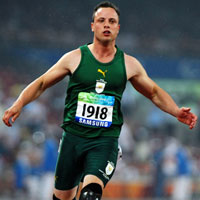
The Blade Runner is the world’s fastest man with no legs. The double-leg amputee is the world record holder in the 100m, 200m and 400m, with the aid of artificial carbon-fibre limbs.
Oscar Pistorius is a fierce competitor and firm believer that disability does not mean inability. He took the International Association of Athletics Federation to court last year when they refused to allow him to race against able-bodied athletes on the basis that his prostheses gave him an unfair advantage.
He won the legal battle and was able to compete for a place in the South African team for the Beijing Olympic Games.
Although he did not make the final team, he achieved a personal best time of 46,25 seconds in the 400m. Undeterred, he took part in the Paralympics Games where he won gold in the 100m, 200m and 400m for his country. — Phathisani Moyo
Lunch spot: Anywhere that serves good lasagne
Albie and Morne Morkel, cricketers
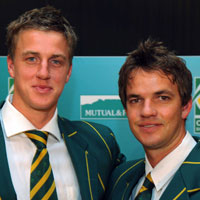
It would be unjust to overlook the contribution the Morkel family has made to the Proteas cause. Albie and Morne Morkel became the first brothers in 56 years to be named as annual Cricketers of the Year in the same season. The Morkels won the prestigious award for 2008 with three other recipients: Johan Botha, Dillon du Preez and fast bowler Mondi Zondeki. Athol and Eric Rowan were the last set of siblings to receive the honour in the same year back in 1952. Albie is a gifted all-rounder and is one of the leading candidates to replace the retired Shaun Pollock and Lance Klusener. The younger Morne has matured over the past year to a fine fast bowler. He was the top wicket taker when he claimed 15 scalps as South Africa demolished England last year. — Phathisani Moyo
Lunch spot: Crawdaddy’s, Menlyn, Pretoria
Ashleigh Simon, golfer
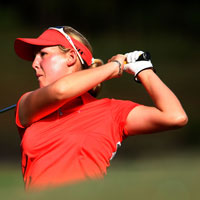
At the age of 20, Ashleigh Simon is by far the best female golfer. She was the youngest player to win the ladies’ South African Amateur Stroke Play and Match Play double and the first player in 101 years to win the Ladies South African Open title three times.
Simon turned professional at the age of 18. She won the 2007 Catalonia Ladies Masters, which was her third event as a professional. She became the youngest-ever professional winner on the Ladies European Tour. Simon also won the Ladies Club Championships in 2001, 2002, 2003 and 2004 as well the Champion of Champions Tournament in 2002, 2003 and 2004.
Simon won her first ladies club championships at Royal Johannesburg Kensington Golf Club at age 12 in 2001 and has gone on to win it for four years in a row. In 2001 she won the Junior Club Championships, the Ladies Club Championship, the top 16 knock out and the singles knock out and has since gone on to win these events more than once. — Lucky Sindane
Lunch spot: Home sweet home
Khotso Mokoena, long jumper
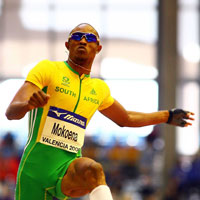
The long jump and triple jump king was the silver lining in the dark cloud that hovered over the South African Olympic team in Beijing. Khotso saved the country the blushes when he captured the only medal at the Games — a silver. A superb 8,24m leap on the tenth day at the magnificent Bird’s Nest Stadium ended the medal drought for the bloated South African team. He has also won medals at the All Africa Games, brought home a silver from the 2006 Sydney Commonwealth Games in Australia for his triple jump and won gold at the World Indoor Championships in long jump. All this, and he is only 24 years old. — Phathisani Moyo
Lunch spot: Anywhere that serves great chicken
Sello Maduma, fencer
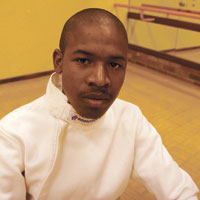
In his second international event Sello Maduma gave a sterling performance against Seung Gu Kim of South Korea at the Beijing Olympics. Maduma lost 13-14 to Gu Kim who is the world’s number one in fencing. But despite all this, his future in the sport is, sadly, bleak. The talented fencer from Mamelodi has missed several international events, which could have helped him grow and possibly win a medal at the Olympics. Maduma doesn’t have a sponsor to help him buy the necessary kit and to pay for his international events. He was initially pulled into the sport after a school’s exhibition in Mamelodi arranged by Ephraim Mabhena. — Lucky Sindane
Lunch spot: Anywhere where good food is served
Johan Botha, cricketer
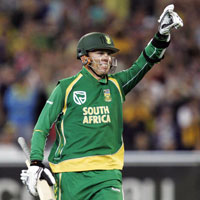
National cricket team coach Mickey Arthur told him to slow down and the result was a place in the national one-day international team as vice-captain. He began his blooming career as a medium pace bowler topping speeds of 125km/h for the Eastern Cape Warriors. Botha switched to a right-arm off break spinner at the advice of Arthur and has worked hard at perfecting the doosra (a ball that turns away from the right-handed batsman). He is in the South Africa T20 World Cup squad but has been cited for an improper action on two occasions. This has not stopped his elevation to lead the limited overs team in the absence of Graeme Smith. — Phathisani Moyo
Lunch spot: Blue Orange Garden Café, Port Elizabeth
Malcom Klassen, boxer
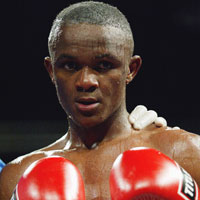
Known as “Stone”, Malcolm Klassen gave the performance of his life last month and became the first fighter to stop Cassius Baloyi in the seventh round to regain the IBF junior lightweight title.
He simply outclassed Baloyi who had six belts. The 28-year-old had Baloyi in trouble from the first round and the veteran was saved by the bell. Klassen was a virtual unknown in the boxing world until he challenged and defeated Gairy Saint Clair for IBF world junior-lightweight title in 2006.
He lost his belt in his first defence against unheralded Mzonke Fana. — Lucky Sindane
Lunch spot: Anywhere in South Africa
Mzwandile Stick, rugby player
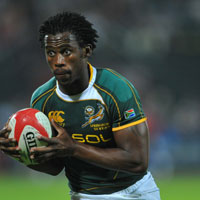
Sevens rugby has always been the poorer cousin of the 15s. But Boks Sevens captain Mzwandile Stick teamed up with his coach Paul Treu to briefly hog the limelight this year — at least for a moment.
Stick led the South African team to two consecutive championships in Dubai as well as the home series that tipped the scales. Fittingly, the 2007 Sasol Springbok Player of the Year scored the winning try in the 12-7 victory over a tough All Blacks. The Stick-inspired Boks announced their dramatic ascendancy to the top by also upstaging other traditional Sevens powerhouses such as Samoa and Fiji. — Phathisani Moyo
Lunch spot: Spur Steak Ranch, Stellenbosch
Rik de Voest, tennis player
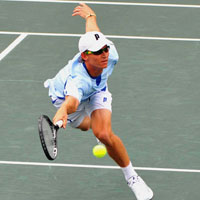
Rik De Voest is the top-ranked South African tennis ace and has just led the Davis Cup to a resounding 5-0 whitewash of Belarus. South Africa’s victory has qualified the team for a place to compete in the world group playoffs for a return to the top rung of men’s team tennis.
This would end South Africa’s 11-year wait to join the elite playing nations. The South African star engineered the 10th successive Davis Cup victory over Belarus. On the individual front, De Voest proved his mettle when he stormed to the final off the inaugural Soweto Open last month although he lost to Italian veteran Fabrice Santoro. — Phathisani Moyo
Lunch spot: Primi Piatti, anywhere